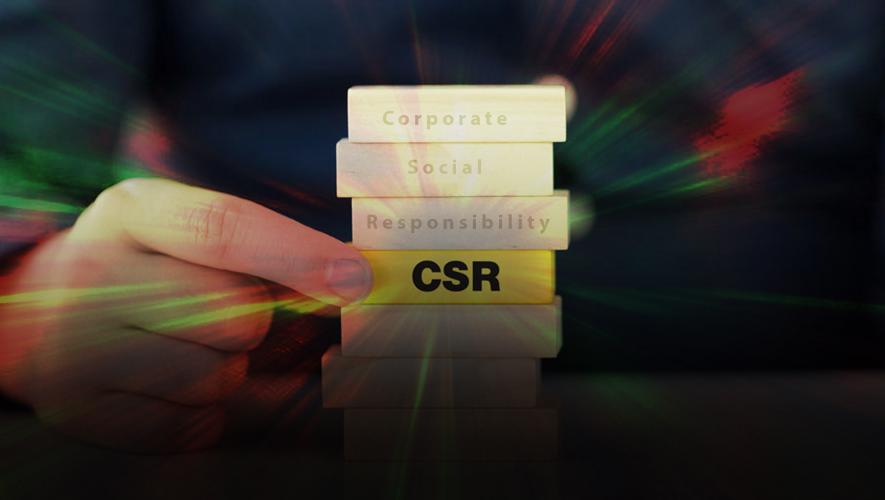Corporate Social Responsibility: Of, By and For Corporates?

When Prime Minister Narendra Modi announced a Rs. 20,00,000 crore stimulus under the Atma Nirbhar Bharat Abhiyan or Self-Reliant India Campaign on 12 May, India’s economy was teetering on the brink and workers had receded to its margins. The hits and misses of this stimulus need scrutiny, but India Inc’s much-talked-about Corporate Social Responsibility or CSR and its role in mitigating the Covid-19 crisis require special attention too.
For starters, India Inc is sitting on an unspent corpus of Rs. 3,000 crore in CSR “savings”, which the NITI Aayog has appealed for it to release, to resuscitate the domestic market. To put things in perspective, corporate altruism by way of CSR expenditure was made mandatory in India in 2013 by a landmark amendment to sections 135(1) and (5) of the Companies Act. Since then, the law has mandated corporates—who meet certain conditions—to spend 2% of their average net profit of the three preceding years on CSR.
Yet, apart from a few Central Public Sector Enterprises and high-profile firms, corporate houses’ response to the ongoing Covid-19 crisis through the CSR route has been limited. Some companies have declared they will donate to the PM-CARES fund, but the legal position and scope of this fund are already under scrutiny, for the rules that will govern its disbursals are yet to be framed. This newly-launched fund is compromised in terms of accountability and a source of confusion, for a pre-existing Prime Minister’s National Relief Fund already exists.
This is where the corporate sector’s CSR funds come in. On 10 April, the Ministry of Corporate Affairs issued an FAQ on CSR which categorically states that contributions made to PM-CARES shall qualify as CSR expenditure. However, the Chief Minister’s Relief Funds or State Relief Funds for Covid-19 are not included in Schedule VII of the Companies Act, 2013. This means that contributions by corporates (or others) to the state funds do not qualify as CSR expenditure. This betrays the ruling dispensation’s fascination with centralising directives—if issuing lockdown guidelines from the top down is unconstitutional then the question is, what is the legal status of a fund whose control lies solely with the Centre? Is it acceptable to centralise these funds, which are being deposited by corporates from across the country to fight a national crisis, especially when the required transparency on their devolution is absent? Considering this maze-like structure of donations and expenditure, the deployment of CSR funds to fight Covid-19 would seem questionable.
A scot-free law for CSR?
The very history of CSR needs to be examined. The legal sanction in 2013 applied to companies that had, in three preceding years, reported a net worth of Rs 500 crore or more, a turnover/revenue of Rs 1,000 crore or more, or a net profit of Rs 5 crore and over. But a CRISIL report on the cumulative spending on CSR across listed and unlisted companies by the end of 2018, noted that an astounding Rs. 53,000 crore of private funds were poured into doing public good in our welfare state.
Similarly, the Standing Committee on Finance that examined the enforcement of CSR notes that Schedule VII of the Companies Act provides for a flexible guidance on CSR spending. That is, CSR funds can primarily go into nine broad areas of spending, which include education, healthcare and the Prime Minister’s National Relief Fund. Such flexibility was in keeping with the broad objective of the law to instil the spirit of social spending in the corporate sector.
So far, CSR funds have gone into education, healthcare, environment, vocational training, rural development, livelihood, drinking water, women’s empowerment, and diverse forms of social and cultural patronage. Companies are also incorporating sustainable development goals (SDGs) into their responsible business actions to meet the United Nations-mandated 2030 global target. However, it is interesting to note that neither the drafting history of the amendments to the Companies Act, nor the CSR Rules framed in 2014 give any explanation as to what factors were considered before the final list of nine enumerated areas was arrived at.
Besides, the Ministry of Corporate Affairs neither issues directions nor advisories to companies in policing CSR expenditures. Yet, CSR has now become a larger-than-life phenomenon. The result is that the non-financial disclosures under this category of corporate expenditure are obscure and ambivalent and they lack a uniform reporting structure.
At the same time, the domestic philanthropy market is thriving. Year after year charities, foundations, trusts, partnerships, donations, sponsorships, reserved funds, employee volunteer activities, strategic alliances and market collaborations under the corporate banner have boomed. By 2016, such private philanthropic expenditure (flowing from corporations to individuals) added up to a cumulative Rs 70,000 crore.
This is ironic, for while investors and market-watchers demand transparency and accountability from companies, CSR is a conduit for the corporates, an opportunity for them to conduct favourable public relations—it enhances brand equity and the image of a business and upgrades corporate reputation.
CSR is an umbrella term synonymous with business-society relations, but the fact is that the “responsibility” aspect of CSR lies solely at the discretion of corporations. Legally, companies operate in a limited liability set-up: thus, CSR spending is taking place, but without the law providing even a working definition of the “non-financial disclosures” that companies must make. This gives immense leeway to the corporate sector to decide what to do with their CSR “savings”.
India has established no government monitoring agency for oversight over CSR, so companies frame their own methodologies to liberally allocate CSR money to pet projects. Corroborating this pitfall is the Doing Good Index, published in 2018 by the Centre for Asian Philanthropy and Society. This first of its kind survey, after examining the factors that enable or impede private social investment, rated India as “Doing Okay” in terms of corporate philanthropy. This is despite CSR being mandatory in India—not so in other Asian countries.
CSR for, by and of the corporates:
A company may list out its “socially-good” activities beyond its core operations in its annual report and release this to stakeholders as “free and transparent” communication. However, when there is no clear direction or blueprint of what constitutes international or domestic CSR and its management, the value of such transparency is moot. In fact this is a lacuna and that is why, in operational terms, CSR has created ambiguity in reporting structures rather than clarity. There is growing fragmentation even in the terminologies used in these CSR reports, which has a detrimental effect on corporate governance.
It is an established premise that corporations demand laissez faire—minimum government intervention—and that they want markets and “competition” to rule the roost. Legally-mandated CSR is the government’s way to make corporations accountable to the country’s welfare needs. This duality has had a paradoxical effect on how corporates report their CSR expenses: while the law mandates a formal top-down reporting structure that informs the public and stakeholders about specific social expenditures, in reality there exists a bottom-up praxis in which companies enjoy a monopoly over decision-making and the freedom to spend 2% profits at their own pace and in their own way.
On top of it, the discourses being generated on CSR are also based on what corporates themselves say about their CSR expenses. When their altruistic behaviour does not fall within a single framework in India, what we have ended up with is a diverse set of open-ended principles, standards, codes and guidelines on spending and reporting.
For instance, the Securities and Exchange Board of India mandates a Business Responsibility or BR report describing the initiatives taken by entities listed with the National Stock Exchange. This BR must detail the CSR spending from an environmental, social and governance perspective and lay them out in the annual report. BR reports are expected to address six other principles including ethics, employee relations, respect for human rights, anti-corruption and bribery related matters. But BR report data is available only for the 100 largest firms. This is why there is urgent need to define a coherent form of reporting CSR expenses across companies.
The Bombay Stock Exchange and the Indian Institute of Corporate Affairs have worked on developing a CSR index, but it is yet to see light of day. Still, it is understood that if CSR were being fully complied with, corporates would have been spending Rs. 22,000 crore a year under this category.
Rising companies, rising CSR:
Indeed, if CSR discourses are a mechanism for business houses to reflect their social responsibilities and obligations, then we need to ask: can these models be altruistic if they are self-created? And what if these expenditures are being made only because there is pressure on them from parent corporations or communities?
Unfortunately, CSR has remained peripheral in most Indian and global organisations. It hardly ever extends beyond the large, high-visibility branded companies in any country. All the CSR indexes and rankings, codes and standards, as well as reports and audits are focused on a few thousand companies.
In India, according to their official websites, the Federation of Indian Chambers of Commerce and Industry (FICCI) has 2,50,000 companies across states as its members. The Confederation of Indian Industry or CII has around 9,000 members from the private and public sectors, including small and medium enterprises and multinational corporations. And it has an indirect membership of over 3,00,000 enterprises from around 276 national and regional sectoral industry bodies.
Besides, the Associated Chambers of Commerce & Industry of India (ASSOCHAM) represents more than 250 chambers and trade associations that cater directly or indirectly to over 4,50,000 members. The latest entrant to the league, the Dalit Indian Chamber of Commerce and Industry (DICCI) connects 5,000 members through 18 state chapters and seven chapters abroad.
Combined (after taking into account dual memberships), this amounts to over 10,00,000 companies that span the length and breadth of India. India is nowhere close to reporting on the CSR expenses undertaken by this large mass of companies. Therefore, the non-representative nature of the current CSR rankings is a given. One can even argue that CSR is the preserve of a tiny corporate elite, a miniscule business minority that gets talked about for its expenses.
Furthermore, with no specific scale for a macro-level indicator to authentically assess or compare CSR expenses, one cannot effectively conclude if their social investments are reducing the gap between the rich and poor or making the environment safe and hospitable as claimed.
In a growth-seeking capitalist global economy, the obscurity in CSR management is unacceptable considering its vast coffers. It is time to democratise market operations and insist on meaningful reporting of CSR activities and spending. This will open a medium to engage in the CSR discourse positively and critically. This dialogue will pave the way for organisations to make consistent, quantifiable and comparable CSR reports and let stakeholders question company operations and make informed decisions.
CSR must help raise transparency and accountability of companies, and more importantly, it must make companies active participants in the last-mile delivery of profit-sharing through welfare policies. Else, CSR will remain a boardroom discussion on public solidarity—even during a pandemic.
The author is assistant professor, St Joseph’s College of Law, Bangalore. (With thanks to Prof Dibyadyuti Roy, IIM Indore, for research mentorship.) The views are personal.
Get the latest reports & analysis with people's perspective on Protests, movements & deep analytical videos, discussions of the current affairs in your Telegram app. Subscribe to NewsClick's Telegram channel & get Real-Time updates on stories, as they get published on our website.
























